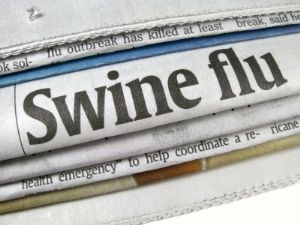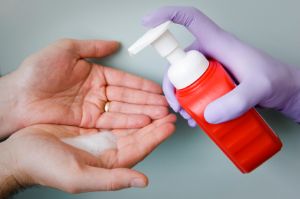 Swine Flu: What Should You Know and Do?
Swine Flu: What Should You Know and Do?Disclaimer2: The information below is from the Centers for Disease Control (CDC), The World Health Organization (WHO) and from discussions with experts in Infectious Disease. My goal is to "break this down" into terms that you can easily understand and use for your benefit. This information does in no way replace that of your personal healthcare provider and if you are concerned, you should seek more information. Please feel free to provide any feedback to me via my website, www.drsharononline.com.
There has been a tremendous amount of media coverage around recent reports of the HINI Influenza Virus, better known as Swine Flu and it's easy to panic. However, as with anything knowledge is POWER and it's important to really get to the basic facts in a simple and direct manner. As of today; there are 403 confirmed cases of Swine Flu and 1 death the
 The world is watching the spread of this virus and President Obama noted that it's not clear that the swine flu outbreak will turn out to be any worse than ordinary flu. "It may turn out that H1N1 runs its course like ordinary flus, in which case we will have prepared and we won't need all these preparations," Obama said. Further, the President, in my opinion rightfully noted that; "We don't know for certain that this will end up being more severe than other seasonal flus that we have," Obama said. "And it's been noted, I think, before that you have over 36,000 people die on average every year from seasonal flus. You have 200,000 hospitalizations. It may turn out that H1N1 runs its course like ordinary flus, in which case we will have prepared and we won't need all these preparations." The ongoing outbreak of novel influenza A (H1N1) continues to expand in the
The world is watching the spread of this virus and President Obama noted that it's not clear that the swine flu outbreak will turn out to be any worse than ordinary flu. "It may turn out that H1N1 runs its course like ordinary flus, in which case we will have prepared and we won't need all these preparations," Obama said. Further, the President, in my opinion rightfully noted that; "We don't know for certain that this will end up being more severe than other seasonal flus that we have," Obama said. "And it's been noted, I think, before that you have over 36,000 people die on average every year from seasonal flus. You have 200,000 hospitalizations. It may turn out that H1N1 runs its course like ordinary flus, in which case we will have prepared and we won't need all these preparations." The ongoing outbreak of novel influenza A (H1N1) continues to expand in the
As persons of faith, let me remind us all that God has not given us the spirit of fear but rather He has given us power. However, this is not an excuse not to prepare yourself and your family to take every precaution just as you should for the seasonal flu. The Body of Christ has to be equipped to address this issue in our families and indeed in our congregations. The young and the elderly are at greater risk and who better to help protect and spread "good" information than the church. I would hope that one positive out of this outbreak will be a record number of Influenza vaccines being requested in the Fall. While the emphasis is now on the "Swine Flu", we must be reminded that the "regular/seasonal" flu is a contagious respiratory illness caused by influenza viruses. It can cause mild to severe illness, and at times can lead to death. The best way to prevent the flu is by getting a flu vaccination each year.
According to the CDC, every year in the United States, on average:
 Some people, such as older people, young children, and people with certain health conditions (such as asthma, diabetes, or heart disease), are at high risk for serious flu complications. I challenge churches to adopt a program NOW to educate about flu and prevention of the flu and to carry this on through the early fall months. Work with your local health department and schedule a "vaccination" Sunday or Wednesday night wherein those at risk are vaccinated against the flu. Let's just not TALK about health, let's DO something about health. If your congregation needs more information or resources contact, www.cosharfoundation.org and join the National Health Ministry Network, free of charge.
Some people, such as older people, young children, and people with certain health conditions (such as asthma, diabetes, or heart disease), are at high risk for serious flu complications. I challenge churches to adopt a program NOW to educate about flu and prevention of the flu and to carry this on through the early fall months. Work with your local health department and schedule a "vaccination" Sunday or Wednesday night wherein those at risk are vaccinated against the flu. Let's just not TALK about health, let's DO something about health. If your congregation needs more information or resources contact, www.cosharfoundation.org and join the National Health Ministry Network, free of charge.
What is Swine Flu?
Swine (pig) Influenza (Flu) is just that … flu found in pigs. Just like humans get illnesses, specifically like the flu-pigs can get the flu. So "Porky" has the flu, that's all Swine Flu is with one catch; although Swine Flu does not NORMALLY infect humans we all now know that it can.
I don't understand how can HUMANS get a disease that PIGS have?
Although we are hearing a lot about the Swine Flu, you must remember that indeed it is actually RARE for pigs to give humans an illness. Also, this is not a "new disease". According to the CDC, these cases happen in people with direct contact to pigs (e.g. children near pigs at a fair or workers in the swine industry). As we now know, there are cases wherein people get Swine Flu and then pass it on to others just like we do the human flu by coughing or sneezing or touching something that has the flu virus on it and then putting your hand on your mouth or nose.
 Oh goodness, I'm sneezing and feel stuffy... Do I have SWINE Flu?
Oh goodness, I'm sneezing and feel stuffy... Do I have SWINE Flu?
Let's not panic, to be clear; if you are sneezing, have watery eyes and feel stuffy more than likely in April/May it is NOT Swine Flu it is SEASONAL Allergies.
The SIGNS of Swine Flu are:
Ø Fever and Chills
Ø Feeling Tired and just feel BAD
Ø No interest in eating (no appetite)
Ø Cough
Ø Some people also have
o Runny Nose
o Sore Throat
o Vomiting
o Feel like you want to vomit (i.e. nausea)
o Frequent bowel movements (diarrhea)
What should I do if I THINK that I may have Swine Flu?
Call your doctor. Simple things that you should do to prepare for your visit, I encourage you to write them down and if you are nervous about talking with your doctor, take a friend or family member with you:
o Have you recently traveled to
o Have you been around someone that has recently traveled to
o Have you been around someone with flu-like symptoms?
o What are your SPECIFIC symptoms and when did they start?
Write down YOUR questions for your doctor as well and be prepared to take notes.
Sidebar: For adults, call 911 or go to the Emergency Room if you have the following:
- Difficulty breathing
- Dizziness
- Confusion
- Severe or continued vomiting
- Pain/pressure in the chest or stomach
Remember that the symptoms for swine flu are almost the same as with the regular flu. Only your doctor can give you the correct diagnosis.
What Will the Doctor Do?
You should expect that your doctor will take time to listen to your concerns and examine you. He/she may run tests if they think that it are necessary. You must understand that it is highly UNLIKELY that you have Swine Flu. Trust your health professional to use their best judgment to make a diagnosis and help you, but you must understand that they are learning new things and hearing details every day during this outbreak as well. There is no real "blood test" to determine if you have Swine Flu, however there is a test that your doctor can perform but ONLY if they think that there is a possibility that you may have the flu. Please note that as with most things in medicine-EARLY diagnosis is better. Most people spread the virus without even knowing it because they don't have symptoms for the first few days. For goodness sake, if you're sick-don't go into the office, school or other areas that you can "spread" your germs around.
I got the flu vaccine, am I covered for Swine Flu?
No, this is different from the Human Influenza Virus which causes the "typical" flu. There is no vaccine for Swine Flu at this time. According to Dr. Richard Bessler, the CDC is taking the first steps taking place to get "seed stock" for a Swine Flu vaccine.
 What is the treatment if I DO have SWINE FLU? Am I going to Die?
What is the treatment if I DO have SWINE FLU? Am I going to Die?
There are medications for the flu for both prevention and treatment, which are also used in Swine Flu. Let's keep it SIMPLE… the SWINE Flu is just that another type of flu so the best care is rest, plenty of fluids and care based on your symptoms. While many people do die of the flu every year; generally these are people who are elderly and have other medical conditions which make them more at risk. This flu will generally last about 7 days; only one case in the
Well, I am an ADULT but what about my Child?
We must take special care with our children because they are more at risk and often can't tell us exactly what is going on with them. Watch for these signs in children and get your child to a physician, Emergency Room or Call 911 depending on how serious the symptoms. When in doubt with children, don't delay at all if your child has:
- Fever with a rash
- Dehydration
- Fast breathing (not related to running or activity)
- Bluish skin coloration
- Slow to wake up or sluggish interaction
- Flu-like symptoms that get better but then come back sometimes worse
- More "cranky" or increased irritability
Thank goodness I don't have the Flu but how can I make sure that I won't get it? Should I wear a Mask?
- Whenever possible, rather than relying on the use of facemasks or respirators, close contact with people who might be ill and being in crowded settings should be avoided.
- Facemasks should be considered for use by individuals who enter crowded settings, both to protect their nose and mouth from other people's coughs and to reduce the wearers' likelihood of coughing on others; the time spent in crowded settings should be as short as possible.
- Respirators should be considered for use by individuals for whom close contact with an infectious person is unavoidable. This can include selected individuals who must care for a sick person (e.g., family member with a respiratory infection) at home.
These interim recommendations will be revised as new information about the use of facemasks and respirators in the current setting becomes available.
 There are simple things that YOU can do:
There are simple things that YOU can do:
ü When washing hands with soap and water:
· Wet your hands with clean running water and apply soap. Use warm water if it is available.
· Rub hands together to make a lather and scrub all surfaces.
· Continue rubbing hands for 20 seconds. Need a timer? Imagine singing "Happy Birthday" twice through to a friend!
· Rinse hands well under running water
· Dry your hands using a paper towel or air dryer. If possible, use your paper towel to turn off the faucet
Remember: If soap and water are not available, use alcohol-based gel to clean hands.
When using an alcohol-based hand sanitizer:
· Apply product to the palm of one hand
· Rub hands together
· Rub the product over all surfaces of hands and fingers until hands are dry.
ü When should you wash your hands?
· Before preparing or eating food
· After going to the bathroom
· After changing diapers or cleaning up a child who has gone to the bathroom
· Before and after tending to someone who is sick
· After blowing your nose, coughing, or sneezing
Ø Cover your nose and mouth with a tissue when you cough or sneeze. Throw the tissue in the trash after you use it.
Ø Avoid touching your eyes, nose or mouth especially if you have not washed your hands.
Ø Try to avoid close contact with sick people.
o The Flu is thought to spread mainly person-to-person through coughing or sneezing of infected people.
Ø If you get sick, CDC recommends that you stay home from work or school and limit contact with others to keep from infecting them.
o If you are sick and must go out into the public, wear a mask to keep from infecting others. For more information on how to take care of a sick person with Swine Flu visit: http://www.cdc.gov/swineflu/guidance_homecare.htm
Ø Stay home for 7 days after the start of illness and fever is gone
Ø Get plenty of rest
Ø Drink clear fluids (such as water, broth, sports drinks, electrolyte beverages for infants) to keep from being dehydrated.
